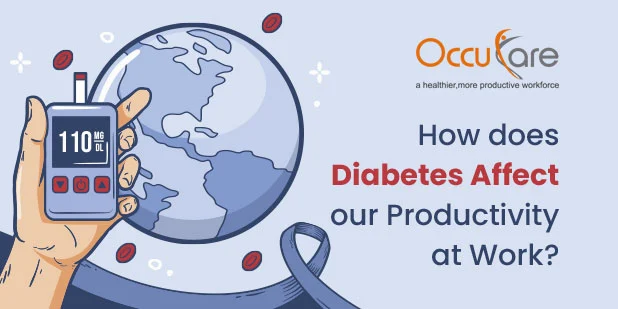What is Diabetes?
Diabetes is a medical disorder in which people’s bodies can’t create enough insulin or can’t properly use the insulin which they produce. Insulin is a hormone that regulates the glucose level, a type of sugar, into your cells and so controls its amount in the bloodstream. Insulin is required since glucose is the body’s primary source of energy. Glucose can be produced by the human body or obtained through food.
Diabetes is of different types that can be seen below:-
Type 1 diabetes:
The pancreas does not manufacture insulin in type 1 diabetes, which is an autoimmune illness. Type 1 diabetes cannot be avoided. Insulin is required for patients suffering from type 1 diabetes.
Type 2 diabetes:
Develops when the pancreas quits making enough insulin or the body’s use of the insulin generated becomes ineffective. Many people with type 2 diabetes may control their disease by diet and exercise, but others may require medication.
Gestational diabetes:
During pregnancy, a woman’s body stops generating or utilizing insulin properly, resulting in gestational diabetes.
Diabetes is one of the country’s most challenging public health issues. Diabetes is also linked to higher economic expenditures due to lost working days, as diabetics have a 2–3 times higher rate of sickness absence than the general population. Workplaces can help or impede diabetes self-management, but there has been little research in India on the topic. Check out the best occupational health software.
By examining the perspectives and experiences of employees with diabetes, this paper hopes to contribute to closing this gap.
A total of 43 people with diabetes were purposefully recruited to see how they dealt with their diabetes at work.
Interviews were tape-recorded and transcribed in a semi-structured fashion. A continual comparison technique was used in the analysis.
Despite the fact that respondents had told their managers of their diabetes, they believed their supervisors had little understanding of the impact of the workplace on their capacity to control their disease. They didn’t anticipate their bosses to be supportive, and they were worried about being stigmatized or treated unfairly. The demands of the job came first. Many had to adjust their illness management to meet their profession, and they reported having blood glucose levels that were higher than optimum, putting them at risk for long-term problems.
The way employees with diabetes handle their disease at work has received little attention.
This study reveals that managers need to be more aware of the short and long-term financial benefits of assisting employees with diabetes in efficiently managing their disease at work.
In order to manage their sickness properly, employees may require individually assessed and adapted workplace help.
Diabetes can induce symptoms like stress and fatigue, as well as chronic diseases like hypertension and neuropathy, even if it is well-managed. For people living with and treating diabetes, stress, in particular, can be a big impact. For those with diabetes, checking blood sugar, taking medications, keeping a healthy diet and exercise routine, and worrying about long-term health implications can all be stressful. Physical stress and poor glucose management are also linked, which can make recovery from illness even more difficult.
Diabetes-related chronic health difficulties can result in frequent, unscheduled absences, costing organizations significant amounts of money in lost productivity.
Diabetes, if not properly controlled, can lead to serious health problems such as heart disease or kidney failure, as well as disability leave, which means less money for the individual and reduced productivity for the company. Covering an employee’s medical claims adds to the burden if the firm is self-funded. Hundreds of thousands of claims can result from these serious illnesses. Health and Safety management software will help you as it provides comprehensive functionality on the market.
Workplace health and wellness has improved in recent years as more people strive to live better lives and seek out companies who would assist them. Employers are focusing on workplace health in a variety of ways, including on-site exercise and medical facilities, employee engagement events, and improved dietary options in cafeterias and vending machines. Employers who can provide these services and nurture a healthier staff will experience their benefits, according to the benefits study. Employees are happier and more productive when they are healthy, and absences are reduced. However, chronic health disorders such as diabetes and its complications are as common as ever, and the consequences for businesses’ bottom lines can be disastrous. Employers should proactively focus on employee health, especially diabetes and related illnesses, to address health-care expenditures, costs of absence, and even the length of disability leave.
Conclusion:
Diabetes’ consequences on employment and productivity are projected to become more pressing as the population grows more diabetic. Our findings are consistent with cross-sectional studies’ findings, and they add to the growing body of evidence that diabetes reduces the likelihood of later employment. We discovered that diabetes lowered the absolute likelihood of working by 4.1 percentage points for women and 7.5 percentage points for men, even after controlling for other factors assumed to be significant to the decision to work, such as other chronic health problems and job characteristics.
The way employees with diabetes handle their disease at work has received little attention. This study reveals that managers need to be more aware of the short and long-term financial benefits of assisting employees with diabetes in efficiently managing their disease at work. To manage their sickness properly, employees may require individually assessed and adapted workplace help.
The ability to work appears to be harmed by Diabetes mellitus. When compared to the hypertensive group, patients with Diabetes mellitus had more difficulty doing work. Setting up diabetes preventive programmes, as well as developing and implementing effective targeted interventions to assist workers in better managing their disease, are all necessary. Otherwise, the burden of diabetes in the working-age population may worsen. Employer-implemented intervention programmes to promote the physical health and well-being of their diabetic employees could be a smart way to keep productivity under control. As a result, treating diabetes and its complications with medicine, food, and exercise is expected to save money while also improving the health and quality of life of those who are at risk of getting diabetes or who already have diabetes.








